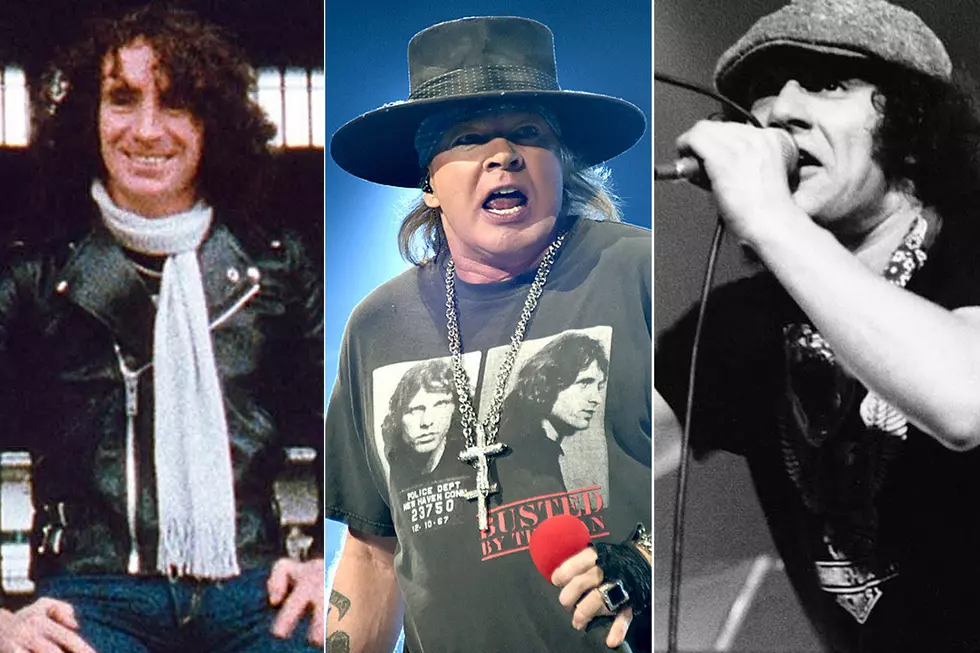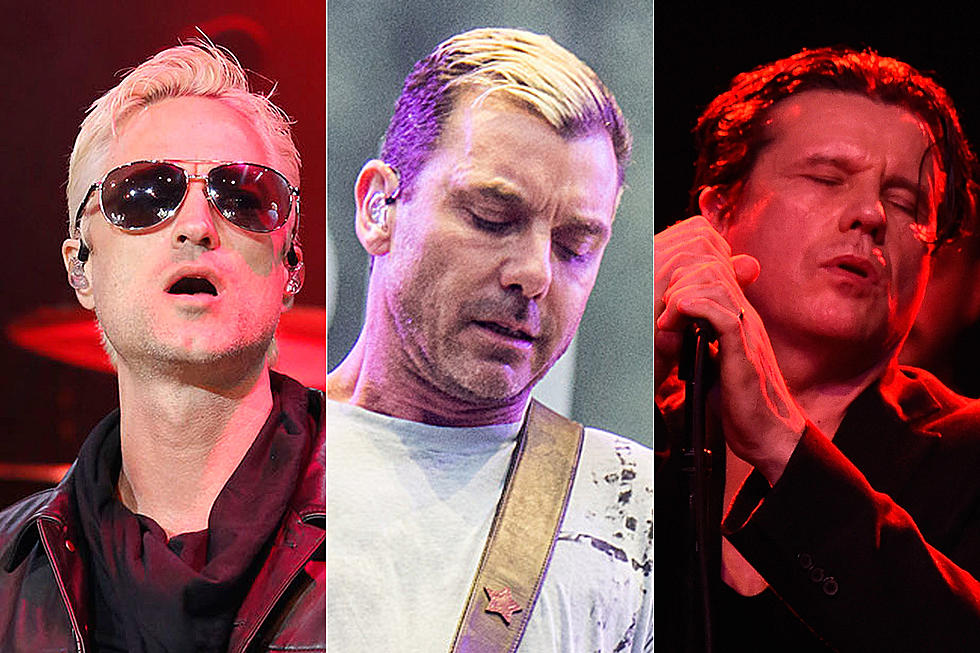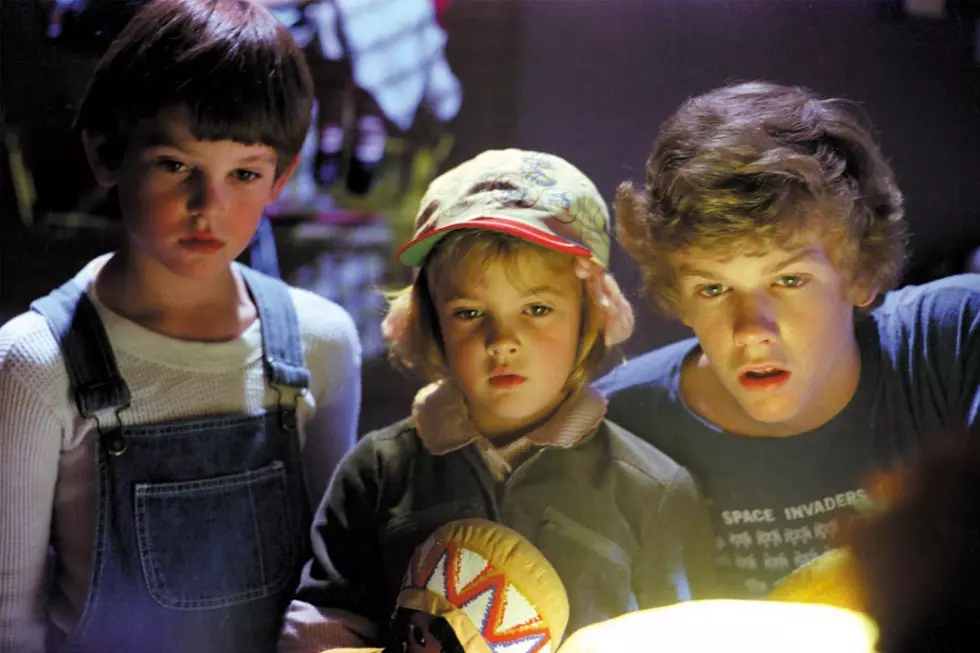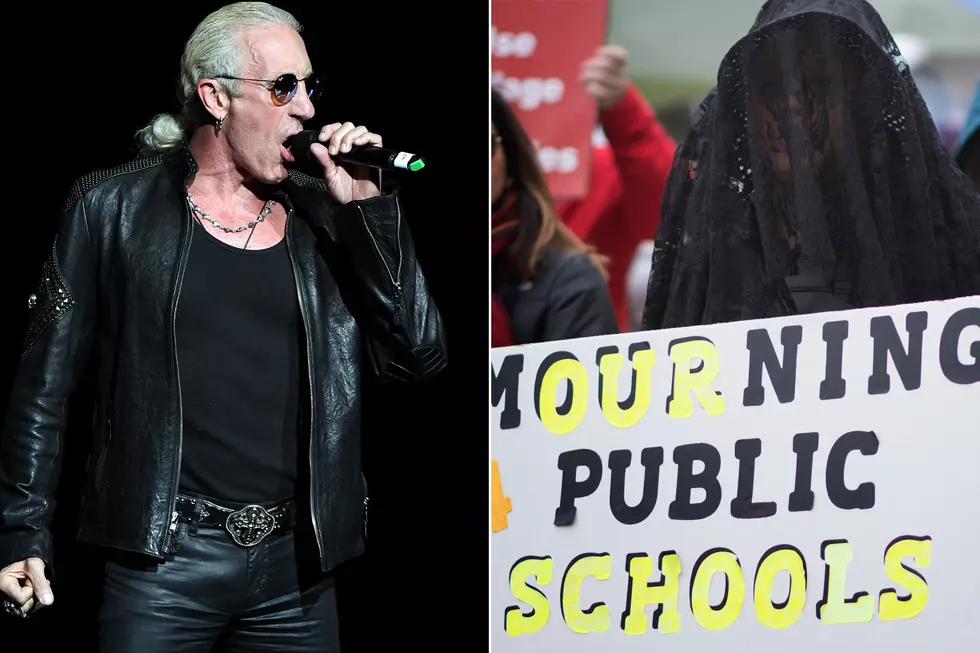
AC/DC’s Past, Present and Future: Our Writers Answer Five Big Questions
In April 1980, Brian Johnson joined and helped save AC/DC following the death of Bon Scott. In April 2018, the band's future is once again in doubt, after a series of events that left guitarist Angus Young as the only remaining member of the band's 1994-2014 lineup.
That got us thinking: Which era of the band's career is the best? How different would things have been if Scott was still around? Exactly what should they do next? Our writers tackle these and other ballbreaking questions.
Who fronted AC/DC’s best era - Bon Scott or Brian Johnson?
Michael Gallucci: I definitely prefer the AC/DC albums made with Bon Scott, though I do think Back in Black is their best. They sort of just fell into formula over the years, but I'm guessing this probably would have happened if Scott was still around too. Still, I've always thought Johnson is the better singer. Too bad he wasn't there for those early records.
Matthew Wilkening: Both are awesome -- but it's Bon Scott. He sings on four of their five best albums, and Let There Be Rock is even a nose ahead of Back in Black on my list. Johnson is a better pure singer, sure, but Scott's witty lyrics and vocal style are far more distinctive. Even the band seems to agree: 35 years and 10 albums after his death, set lists were still half-comprised of Scott songs on the Rock or Bust tour.
Nick DeRiso: I live with no small amount of conflict on this issue, since I believe that Bon Scott was the better frontman but that Back in Black is AC/DC's best album. Like many, I find some resolution in the idea that maybe (just maybe) Scott had some secret hand in the Back in Black process – that, really, it’s a Bon Scott album too. Were that the case, and I have no idea if it is, my answer would be clear.
Martin Kielty: They’re not really directly compatible, to my mind. It’s like asking which is your favorite Dr. Who, and the answer has more to do with when you discovered AC/DC rather than which incarnation is “better.” While Scott was gutsier, more bawz-oot (as we say in Glasgow) and sleazier, Johnson brought with him a higher-class and perhaps more sheeny production, with Mutt Lange’s influence really being heard like he wasn’t on Highway to Hell. For a pub band made good, it’s Scott; for a world-class blues-rock force, it’s Johnson ... and no offense to either incarnations.
Jed Gottlieb: Yes, I am going to take the coward way out and say both, or neither, whatever ... Scott and Johnson succeed and fail for different reasons. Johnson was with the band so long he had plenty of time to loads of great and not-so-great records. Scott didn't last long enough to make bad records, but he would have -- everyone does. Johnson also had an advantage because he walked into Back in Black, joining a band at its peak of performance.
Would Back in Black have been just as big with Bon Scott singing?
Gallucci: Not sure if it would have been as big, but it still probably would have been the band's huge breakout album. Those songs are among their all-time best and that certainly helped push the band over. Plus, you can't discount Johnson's voice, a more traditional and muscular rock 'n' roll weapon than Scott's occasional nasally whine.
Wilkening: Probably not. The band was on the rise with Scott at the helm. But the change to a more traditionally powerful vocalist is part of what made Back in Black more accessible. In a sad but understandable way, Scott's death also earned the band an enormous amount of goodwill -- which was multiplied immeasurably when people realized how amazingly well they rose to the occasion without him. (I'd still really like to visit the alternate universe where a post-Highway to Hell Bon Scott album exists, though.)
DeRiso: The songs made the album, which brings us back to Scott’s lack of participation (supposedly) in the writing. With Scott here throughout, it stands to reason that Back in Black would inevitably be much different. For the sake of argument, let’s stick with our conspiracy-theory theme: If you had the exact same album, since Scott (allegedly) participated in the early writing, with the only difference being who sang the words? I think it would be just as big either way.
Kielty: Sidestepping the fact that it wouldn’t have happened at all, I doubt it. The next album with Scott would almost certainly have been bigger than Highway, but that big? I don’t see Scott conforming to what producer Mutt Lange wanted in the same way that Johnson did. Plus, while naughty songs about genital size and STDs are hilarious schoolboy stuff, if we compare the more “grown-up” lyrical themes, I think Johnson does it better. When you tie that in with the way music was changing in the early ‘80s, especially in the U.K. with New Wave giving way to new romantic, I think they needed what Johnson brought. Scott’s album would still have been worth hearing, though.
Gottlieb: That depends on how much credit you give Johnson for the songwriting on Black. The album became such a blockbuster because "You Shook Me All Night Long" hit huge with mainstream rock fans. Without that single, the album would have done well, but it wouldn't have become the iconic creation we know and love. If you consider half of that song to be Johnson's brainchild, then he played a major role in breaking the band worldwide.
Which Brian Johnson-era song would it have been the most fun to hear Bon Scott sing?
Gallucci: "You Shook Me All Night Long," though there are plenty of candidates on the Back in Black album -- except maybe the title track, which gains much of its force because it serves as sort of an introduction to Johnson and a statement of determination from the band following Scott's death. That poignancy makes it distinctly a Johnson song that wouldn't have worked as well with Scott.
Wilkening: The spoken intro on "Rock and Roll Ain't Noise Pollution" would be perfect for him -- and the rest of the song sticks closer to the band's earlier sound (and Scott's way with words) than the rest of the chromed-up Back in Black. I'm not a "Bon Scott wrote Back in Black" truther, but if I was this would be my first piece of evidence.
DeRiso: I’m going with the painfully obvious: "For Those About to Rock (We Salute You).” Overall, the follow-up to Back in Black was a bit of a letdown – and that only bolstered the argument of those who thought Brian Johnson had help with his AC/DC debut – but not this song. Who hasn't wondered if “For Those About to Rock,” already a reliably explosive concert-closer, can actually be taken up another notch? If anyone could, it’s Bon Scott.
Kielty: Tough one. I have a soft spot for “War Machine” from Black Ice, but it would have to be “For Those About to Rock” for its anthemic pomp and circumstance, and really illustrating Scott on the scale he’d surely earned and have made the most of.
Gottlieb: Scott would have crushed "Rock and Roll Ain't Noise Pollution." I imagine him doing it even slower and sleazier, almost like a sonic sequel to "Ride On." Backup: "Shake Your Foundations," just because of the "Aye, aye, oh" chant.
Is Brian Johnson the best replacement singer ever?
Gallucci: He's certainly up there, especially in terms of bringing his band new levels of success. Phil Collins was already a member of Genesis when he took over vocals, and Sammy Hagar was a solo star before he joined Van Halen, but Johnson came out of nowhere (don't act like you heard of Geordie before he joined AC/DC). So under those conditions, you'd be hard-pressed to find someone who did as much for a band as Johnson. Plus, he's a better singer than Bon Scott.
Wilkening: You have to set some ground rules when answering this one -- after all, Bon Scott could himself be considered a replacement singer. But starting with bands that had already released albums and earned some worldwide attention, my vote goes to Iron Maiden's Bruce Dickinson, who boosted an already successful band into a completely different trajectory.
DeRiso: I’m going to hedge. He’s the best outside replacement singer ever. As somebody who arrived seemingly out of nowhere, then helped a great band go supernova, Brian Johnson is peerless. In terms of being promoted from within, however, that honor – certainly commercially – goes to Phil Collins.
Kielty: Certainly for AC/DC. They needed not just a voice, but an attitude; and while Johnson is a Geordie from Newcastle, and Scott was a Scot from Kirriemuir, there’s always been a recognizable similarity in the attitudes of Novocastrians and lowland Scots. In the wider rock scene, the change is up there with Dio replacing Ozzy in Black Sabbath, or William DuVall picking up for Alice in Chains’ Layne Staley, or Phil Collins’ replacement of Peter Gabriel in Genesis – but nothing really touches Bruce Dickinson taking over from Paul Di’Anno in Iron Maiden, does it?
Gottlieb: No. But he's certainly tied for the top spot. Everyone always thinks of Van Halen and Black Sabbath when they think of successful replacement frontmen. But Sammy Hagar and Ronnie James Dio never had what Diamond Dave and Ozzy Osbourne had. The only singer who matches Johnson's talent for fitting in while doing his own thing is Bruce Dickinson. Too many forget that Iron Maiden began with the great Paul Di'Anno singing. Like AC/DC, Iron Maiden became slightly more commercial with their second singer, but both lineups made killer albums.
Assuming all options are on the table, what should AC/DC’s next move be?
Gallucci: Is it wrong for me to say I don't care? I really haven't enjoyed an AC/DC album since the '80s. So maybe their next move should be to call it quits.
Wilkening: Make a record with Axl Rose. The chemistry between him and Angus Young on that series of shows was incredible. Johnson stopped writing lyrics for the band way back on 1988's Blow Up Your Video. With Malcolm Young gone, Angus needs a worthy new collaborator. As rewarding (and often underrated) as Rose's epic post-Appetite for Destruction musical ambitions have been, it would be fun to see him presumably forced to set them aside for a bit and stay focused strictly on dirty guitar rock. (It might be funnier to see the look on Young's face as Rose rolls a grand piano and a full orchestra into the studio.)
DeRiso: I’d much rather see them make a new studio album with Brian Johnson than continue touring with only one remaining core member and a cast of substitutes and guest stars – no matter how well Axl Rose has done in mimicking their old sound. Johnson is apparently still capable of doing studio work, and there’s no reason to believe AC/DC can’t replicate the sturdy success of Rock or Bust.
Kielty: Tempted as I am to hanker for Johnson’s return, and also to hear an album with Rose, there’s no AC/DC without Malcolm Young. The band can run on momentum for several more years with the “What would Malc do?” refrain, and Angus will adhere to that policy. But the only thing I can think of that would make me go ‘Hell yeah!’ would be an album of covers of other bands they’d influenced, underlining that influence, with Johnson at the mic, and both he and Rose doing it live if Johnson can’t. And if he can, well, both of them then. Can you imagine them on a duet? Hell yeah!
Gottlieb: Keep going until Angus Young wants to quit. If you don't want to see Axl Rose front the band, don't go see AC/DC. But if great musicians who can still play want to keep touring, let them play! Also, I would happily allow Joan Jett or Airbourne singer Joel O'Keeffe to front the legends.
AC/DC Lineup Changes: A Complete Guide
More From ME TV FM 97.5










